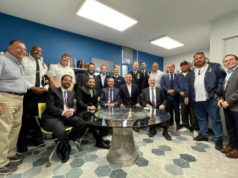 It has been more than 60 years since the Holocaust in Europe, more than 60 years since the world declared “Never again,” more than 60 years since the United Nations adopted the Universal Declaration of Human Rights and declared genocide a crime, and yet the large-scale killing of one group of humans by another continues with no end in sight.
It has been more than 60 years since the Holocaust in Europe, more than 60 years since the world declared “Never again,” more than 60 years since the United Nations adopted the Universal Declaration of Human Rights and declared genocide a crime, and yet the large-scale killing of one group of humans by another continues with no end in sight.
Some believe it is impossible to stop genocide. The Auschwitz Institute for Peace and Reconciliation agrees: Genocide, once begun, is fiendishly difficult to stop. But it can be prevented.
Founded with the joint support of the International Auschwitz Council and the Auschwitz-Birkenau State Museum, the AIPR began its mission in earnest in May 2008 with a one-week seminar for policy makers from four continents, including Argentina, Bosnia, China, the Democratic Republic of the Congo, Germany, the United Kingdom and the United States.
Eighteen scholars, from Israel, Poland and the US, shared their knowledge with participants on the history of genocide and the elements of genocide prevention. The aim was not only to give government officials tools to identify conditions when genocide is likely and to put into place policies to avoid it, but to build an international network or community of professionals who are able to consult and support one another.
These seminars are held as part of the AIPR’s Raphael Lemkin Center for Genocide Prevention, named in honor of the Jewish lawyer from Poland who coined the term “genocide.” Lemkin (1900–1959) campaigned tirelessly for the United Nations to adopt the Convention on the Prevention and Punishment of the Crime of Genocide, in 1948, and all those today who seek to prevent genocide are standing on his shoulders.
One of the seminar instructors is Professor Sheri Rosenberg, director of the Program in Holocaust and Human Rights Studies and director of the Human Rights and Genocide Clinic at Yeshiva University’s Cardozo School of Law. She points out that while the genocide convention is critical, it is not the only legal tool that policy makers can use. “The genocide convention contains a provision that obligates states not only to prevent genocide, but to prevent the incitement of genocide, both within and outside their borders. But human rights law offers many other legal instruments. My goal is to expose policy makers to the full range of legal options they can use in pursuit of the prevention of genocide.”
“One of the most important ways to honor the memory of the victims of the Holocaust is to work to ensure that what was once acceptable—the mass murder of millions in full view of the world—will no longer be acceptable.”
Currently, the AIPR is putting together its next round of seminars for October and November 2009, with government participants expected from 14 countries, including Congo-DRC, Germany, India, Iraq, Pakistan, Sri Lanka and the US.
The seminars, which are endorsed by United Nations officials, will be taught by instructors with expertise in areas ranging from history, political science and law to public health, military strategy, human rights and economics.
Once again they will gather in the infamous town of Auschwitz for a week of lectures, seminars, discussion and personal sharing, all designed to create a community of policy makers who know how to identify a genocide in the making, what measures can be used to intervene to prevent it, and who they can turn to outside their countries for moral and concrete support in these efforts.
In 1934 Albert Einstein wrote: “The brotherhood of the well-intentioned exists, even though it is impossible to organize it anywhere.” Through the continuation and expansion of its genocide prevention seminars, the AIPR hopes, with all due respect, to prove the great physicist wrong.
Another AIPR instructor is Dr. James Waller, professor of psychology and author of Becoming Evil: How Ordinary People Commit Genocide and Mass Killing. Says Waller, “The central role of the Raphael Lemkin Seminars is to help mid-level government officials develop the moral sensibilities to prevent genocide and mass killing. If we can develop these moral sensibilities in a critical mass of government officials, then we have made an important step in developing leaders who have the political will to stop genocide and mass killing and who may be able to transform that will into duty—particularly when innocent lives are falling prey to unchecked collective violence. The unique dialogue and networking that emerges in these seminars brings us one step closer to making ‘Never Again’ a reality in our world.”
In addition to its work in genocide prevention, the AIPR also operates the Raoul Wallenberg Center to teach culture and education officials about the importance of Holocaust memorialization and education, and the impact they have on the prevention of genocide and other forms of violent conflict.
All this takes money of course, so the AIPR is currently raising funds to pay for officials from developing countries to take part in the seminars. Anyone who wishes to make a gift, no matter how large or small, may call the Auschwitz Institute at 212-794-9760. For more information about the Auschwitz Institute for Peace and Reconciliation, visit www.auschwitzinstitute.org.



